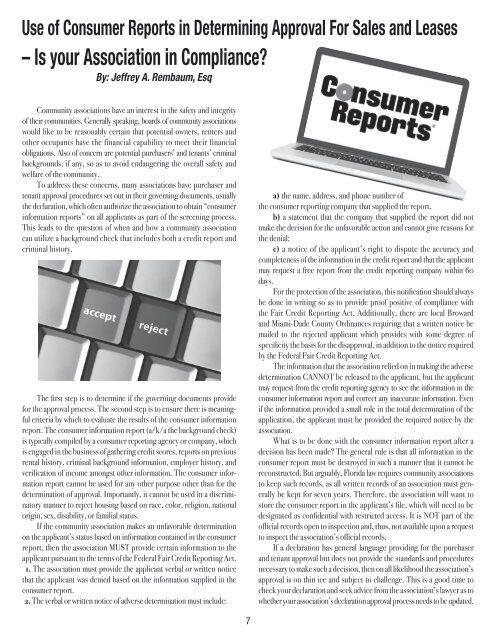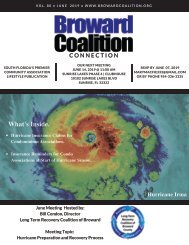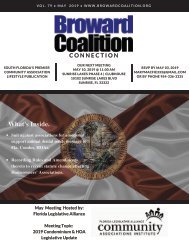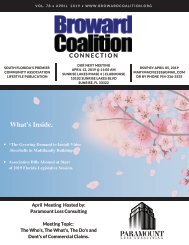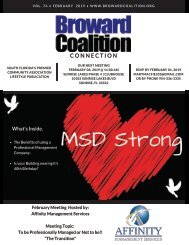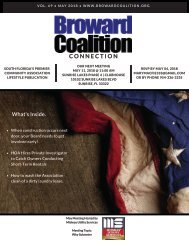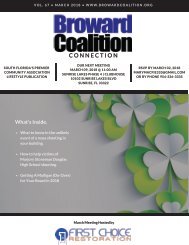October 2018 Newsletter
Create successful ePaper yourself
Turn your PDF publications into a flip-book with our unique Google optimized e-Paper software.
Use of Consumer Reports in Determining Approval For Sales and Leases<br />
– Is your Association in Compliance?<br />
By: Jeffrey A. Rembaum, Esq<br />
Community associations have an interest in the safety and integrity<br />
of their communities. Generally speaking, boards of community associations<br />
would like to be reasonably certain that potential owners, renters and<br />
other occupants have the financial capability to meet their financial<br />
obligations. Also of concern are potential purchasers’ and tenants’ criminal<br />
backgrounds, if any, so as to avoid endangering the overall safety and<br />
welfare of the community.<br />
To address these concerns, many associations have purchaser and<br />
tenant approval procedures set out in their governing documents, usually<br />
the declaration, which often authorize the association to obtain “consumer<br />
information reports” on all applicants as part of the screening process.<br />
This leads to the question of when and how a community association<br />
can utilize a background check that includes both a credit report and<br />
criminal history.<br />
The first step is to determine if the governing documents provide<br />
for the approval process. The second step is to ensure there is meaningful<br />
criteria by which to evaluate the results of the consumer information<br />
report. The consumer information report (a/k/a the background check)<br />
is typically compiled by a consumer reporting agency or company, which<br />
is engaged in the business of gathering credit scores, reports on previous<br />
rental history, criminal background information, employer history, and<br />
verification of income amongst other information. The consumer information<br />
report cannot be used for any other purpose other than for the<br />
determination of approval. Importantly, it cannot be used in a discriminatory<br />
manner to reject housing based on race, color, religion, national<br />
origin, sex, disability, or familial status.<br />
If the community association makes an unfavorable determination<br />
on the applicant’s status based on information contained in the consumer<br />
report, then the association MUST provide certain information to the<br />
applicant pursuant to the terms of the Federal Fair Credit Reporting Act.<br />
1. The association must provide the applicant verbal or written notice<br />
that the applicant was denied based on the information supplied in the<br />
consumer report.<br />
2. The verbal or written notice of adverse determination must include:<br />
a) the name, address, and phone number of<br />
the consumer reporting company that supplied the report,<br />
b) a statement that the company that supplied the report did not<br />
make the decision for the unfavorable action and cannot give reasons for<br />
the denial;<br />
c) a notice of the applicant’s right to dispute the accuracy and<br />
completeness of the information in the credit report and that the applicant<br />
may request a free report from the credit reporting company within 60<br />
days.<br />
For the protection of the association, this notification should always<br />
be done in writing so as to provide proof positive of compliance with<br />
the Fair Credit Reporting Act. Additionally, there are local Broward<br />
and Miami-Dade County Ordinances requiring that a written notice be<br />
mailed to the rejected applicant which provides with some degree of<br />
specificity the basis for the disapproval, in addition to the notice required<br />
by the Federal Fair Credit Reporting Act.<br />
The information that the association relied on in making the adverse<br />
determination CANNOT be released to the applicant, but the applicant<br />
may request from the credit reporting agency to see the information in the<br />
consumer information report and correct any inaccurate information. Even<br />
if the information provided a small role in the total determination of the<br />
application, the applicant must be provided the required notice by the<br />
association.<br />
What is to be done with the consumer information report after a<br />
decision has been made? The general rule is that all information in the<br />
consumer report must be destroyed in such a manner that it cannot be<br />
reconstructed. But arguably, Florida law requires community associations<br />
to keep such records, as all written records of an association must generally<br />
be kept for seven years. Therefore, the association will want to<br />
store the consumer report in the applicant’s file, which will need to be<br />
designated as confidential with restricted access. It is NOT part of the<br />
official records open to inspection and, thus, not available upon a request<br />
to inspect the association’s official records.<br />
If a declaration has general language providing for the purchaser<br />
and tenant approval but does not provide the standards and procedures<br />
necessary to make such a decision, then on all likelihood the association’s<br />
approval is on thin ice and subject to challenge. This is a good time to<br />
check your declaration and seek advice from the association’s lawyer as to<br />
whether your association’s declaration approval process needs to be updated.<br />
7


